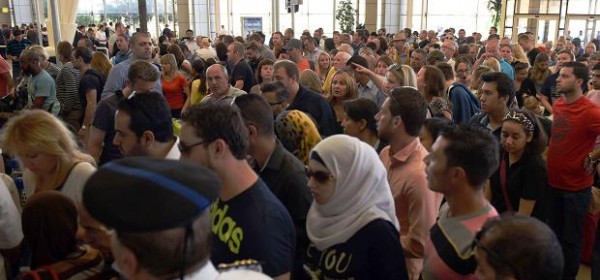Russia today cancelled all its airlines’ flights to Egypt as British holidaymakers desperate to get home from Sharm el-Sheikh grew increasingly frustrated by anger and confusion.
Alexander Bortnikov, head of Russia’s FSB security service, said in televised comments at the start of an emergency meeting of Russia’s anti-terrorist committee that “until we have determined the true reasons for what happened, I consider it expedient to stop flights by Russian aviation to Egypt”.
British spies believe that a bomb may have killed all 224 people on board Metrojet flight 9268 when it crashed in Sinai on Saturday, having been placed in a suitcase in the plane’s hold or smuggled in by baggage handlers or passengers acting for Islamic State (Isis).
In light of this information, David Cameron decided to suspend British flights to and from Sharm el-Sheikh, a decision that drew immediate criticism from Egypt and Russia.
The latest measures introduced by Russia go even further, grounding all flights into the whole of Egypt.
Some planes on their way to take Britons home were turned back in by authorities in Egypt, who were apparently struggling with capacity problems. Flight tracking websites showed some planes on their way to Sharm el-Sheikh turning around in mid-air and returning to the UK.
Thomas Cook later confirmed that only one of four planned flights from the resort back to the UK would be able to operate today, and said that customers were being asked to return to their hotels tonight.
“Presumably it has not gone down very well that they can’t go home today,” a spokesman for the firm admitted. “But it is working to manage that and explain it is beyond our control.”
Thomson Airways said that “a last-minute change in Egyptian government restrictions” meant it could only operate two flights back to Britain today, and Monarch airlines also confirmed that it had been forced to cut five planned homebound flights down to two.
British Airways said it had not been informed of any changes to its schedule, while EasyJet has delayed seven UK-bound flights until tomorrow.
In Russia, Valdimir Putin ordered his ministers to work out the mechanisms to repatriate Russian citizens, but may face problems similar to those that confronted John Casson, the British ambassador to Egypt, when he braved crowds at the airport today.
He spoke to hundreds of infuriated people who had arrived at the airport expecting to fly home, only to be told that no more than a limited number of flights would be leaving.
Mr Casson said that there was a large team of British people on the ground to provide information, which held little sway with Carla Dublin, 35, who pushed through the huddled journalists to give him a piece of her mind.
“We’ve been told that the Egyptian government are arguing with David Cameron and they are not letting planes in,” she said. “So what’s the problem now? You are stuttering now. We want to go home.”
Mr Casson denied reports that the Egyptian government had banned UK flights and said that a package of security measures had been set to get British people home safely.
Hossam Kamal, Egypt’s minister of civil aviation, said that the number of flights permitted to leave for the UK had been cut from 29 to eight because there was too little storage space at the airport for people’s baggage. All travellers have been ordered to carry only hand baggage.
“We had a lack of information, and him telling us two flights have left is neither here nor there,” Ms Dublin said as she waited to return to her hotel once more. “I hadn’t been bothered, but the point is we have no idea why. Obviously it’s not a security reason any more, it’s something else. And that’s what I’m bothered about.”
Ms Dublin was among hundreds of disappointed holidaymakers who had expected to fly from Sharm el-Sheikh today.
A statement from easyJet said: “We’re sorry to inform passengers that our rescue plans that were put in place yesterday have been suspended by the Egyptian authorities.
“Discussions are currently ongoing at the highest political level to resolve this situation. We are very sorry and understand that this is extremely frustrating for our passengers – unfortunately the situation is out of easyJet’s control.”
Some details of the investigation emerged yesterday. A joint US and British intelligence operation used satellites to reveal electronic communications between militants in Syria and Sinai. The tone and content of the messages convinced analysts that a bomb was taken on board by a passenger or member of the ground staff.
Hours later Downing Street declared that a bomb was the probable cause of the crash and it grounded flights, leaving 20,000 Britons stranded and provoking a diplomatic row with Egypt on the eve of President Sisi’s first official visit to Britain.
In a press conference with Mr Cameron yesterday, Mr Sisi said that he would work with Britain over security at the resort, while Egyptian officials called for the decision to be reversed.
Michael Fallon, defence secretary, announced today that Britain would set up a small military operations team in Egypt to monitor extremism in the region and counter the threat posed by Isis in neighbouring Libya.
The move is likely to be seen as an attempt to mollify Mr Sisi as he finishes a visit to London following the dramatic decision to ground flights between the UK and Sharm el-Sheikh.
In a phone call with Mr Cameron yesterday, President Putin made clear that he believed Britain had acted prematurely. Exactly what has changed Mr Putin’s mind in the past few hours has yet to be announced.




